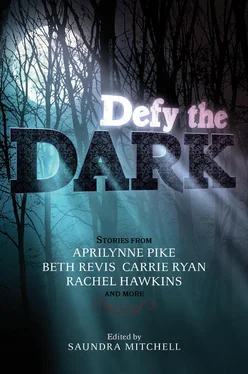It takes a moment before Jeremy understands and I see the realization dawn in his eyes. He looks down again. “Does it matter?” he murmurs almost too quietly to hear.
“I don’t know.”
Silence stretches between us and I’m not sure what to do.
Maybe I should leave.
“Stay.”
It isn’t a command. It’s a plea.
“Stay with me.” His voice is stronger now.
To stay is to admit I belong. But it also means confessing that I don’t.
Is it enough?
I sink to the floor—I’m not ready to share a bed with him, even if that bed is simply a space to sit—and pull the loose end of the deep-red ribbon. Inside the box is the oversized butterscotch chip cookie; the white chocolate is soft but not quite melty against my fingers. I break the cookie in half and hand a piece to Jeremy with a tentative smile.
His eyes sparkle and for a moment I wonder if I see a mist of tears, but he turns away and clears his throat before biting into the sweet confection. He pauses midchew, sets his piece in the white box, and reaches for the ribbon.
“May I?” he asks, and his hands are reaching toward me before I can speak. His fingertips brush the sides of my neck and my breath catches in my throat. When he’s done tying the ribbon around my ponytail, he pulls away and again those warm hands touch my skin. “Red looks good in your hair.”
My turn to confess. “That’s why I picked it.”
His eyes sparkle and I realize I’ve given him a gift.
He turns and stretches his long, beautiful arm up to the bed and slides a book down. “Chemistry?” he asks, already leafing through the pages.
I smile and wonder if the innuendo was intended.
But I guess it doesn’t matter.
As I sit, my shoulder brushing his, the bliss of butterscotch on my tongue, I know what will happen. I see it laid out before me like a film. Jeremy and me, hiding in plain sight, living our elaborate lie. I’ll wear the red ribbon, and no one will even notice. Except Jeremy, who will say nothing. Not in front of anyone, anyway. Never together in the daylight, we will laugh, and drink, and flirt, sharing only the rarest of secret glances.
But at night, we will be here.
Perhaps there will be kisses one day. Perhaps we will be lovers.
But that doesn’t matter. Because now I know.
When the sun goes down we will be
Together.
I will be
Myself.
And we will find
Truth.
Dia Reeves
The Dark Side of the Moon
When Cado snuck up on Patricia in her backyard, her first reaction was not to scream but to thwack him over the head with a silver watering can.
And that was what he loved about her.
“Oh my God, Cado!” She dropped the watering can and tried to break his fall as he wilted into the petunias. “I’m so sorry!”
“Not as sorry as me,” said Cado, blinking away stars similar to the red, white, and blue ones he’d seen strung in the redbud trees along the block as he’d driven up.
Charter was less than an hour from Portero, both towns hidden within the East Texas piney woods, but while Charter consisted of unlovely acres of livestock and hay farms, Portero could have been carved out of gingerbread. By pixies. Stars in the trees, cobblestones in the streets, flowers in all the gardens. A place that charmed and disarmed with its tweeness . . . and then thwacked you over the head.
After she’d checked to her satisfaction that she hadn’t cracked his skull into a million pieces, Patricia threw herself into Cado’s arms and rolled him around in the flowers like she thought she was a milkmaid. “You’re not even supposed to be here until tomorrow!”
“I know, but I wanted to sleep over, and I figured your folks wouldn’t’ve agreed if I had asked first.”
“That’s amazingly diabolical.” Patricia’s kiss was like a stamp of approval. “My influence is finally rubbing off on you.”
But she didn’t ask why he’d come early, probably assuming he wanted to catch her in the shower or something predictable like that. Patricia knew a lot, like what all the initials in the Wall Street Journal stood for and how to apply lipstick so that it never smeared no matter how hard Cado kissed her. But she didn’t know him. Not as well as she thought she did.
He sat up and rescued the bouquet of daylilies from where he’d dropped them after getting clobbered. The petals matched the setting sun and blazed against the black of Patricia’s dress as he presented them to her. “I brought this for you.”
“Why?” Patricia asked, hip deep in flowers, yet staring at the daylilies as if they were alien babies.
“Because you like flowers. Duh.”
“Not as a symbol of love. Those are going to wither and die in a week. Is that what you think about our relationship? That it’s going to wither and die in a week?”
“No,” he said after realizing the question wasn’t rhetorical.
Patricia grabbed the bouquet that he had painstakingly selected and threw it so hard, it sailed over the wrought-iron fence and smacked a passing soccer dad in the face.
Patricia didn’t understand him, but sometimes Cado didn’t understand her, either.
After she helped him to his feet, he grabbed his duffel bag and flute case from the petunias and followed her through the back door into her home.
“Want a cool drink?”
“Maybe later,” he said, distracted by her outfit, a black dress with no back and shoes that exposed her manicured toes—definitely not a milkmaid. She smelled cold and Parisian. “You look nice.”
Patricia twirled for him, showering the floor with pink petunia petals. “My folks are at a canasta party, but after they’ve heard all the neighborhood gossip, they’ll swing by to pick me up. They’re treating me to a farewell dinner at Gitano’s before you steal me away. Wanna come?”
They hadn’t seen each other since he’d gone to Castelaine to see her perform two months ago. They almost never saw each other except at recitals and band camps, like the one they were driving to tomorrow. Although they talked and texted all the time, the whole long-distance thing was beyond suck. “I’d rather stay here with you.”
“They’ll be home any minute,” Patricia insisted, and before he could stop her, she popped the zit on his chin. She was always doing that to him. “I don’t care if it scars you,” she’d say whenever he complained. “I’d rather look at scars than pus.”
“We only have enough time to change you into something less transy,” she said, dabbing his chin with a kitchen towel.
Cado held her away and looked down at himself, his worn jeans and new, blue Fourth of July T-shirt. “Transy?”
“It’s short for transient.” She put her hand over her mouth briefly, as though she had been impolite. “It doesn’t mean anything bad; it’s just what we call people who obviously aren’t from Portero. Usually Porterenes wear black in public.”
“How can y’all stand it? Especially in the summer.” It had to be close to one hundred degrees outside.
“We’re used to it, though it helps not having anything to compare it to.” She led him upstairs and into her room. “I mean, it’s not exactly a law, but it may as well be.”
“Why?”
“Because people die all the time here,” she said solemnly, taking his duffel bag and setting it on her bed. “Death surrounds us. Did you pack a suit?”
“Um . . .” He was inclined to take Patricia seriously when she spoke of death and monsters, now more than ever after what he had seen last month, but still, her mix of weirdness and practicality always mystified him.
“I have a black shirt and pants.”
She rummaged through his poorly packed bag, but after finding the shirt and pants, the search continued. “Where’re your ties?”
Читать дальше












